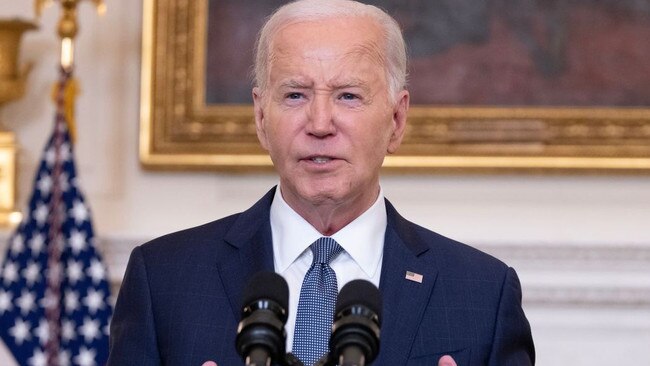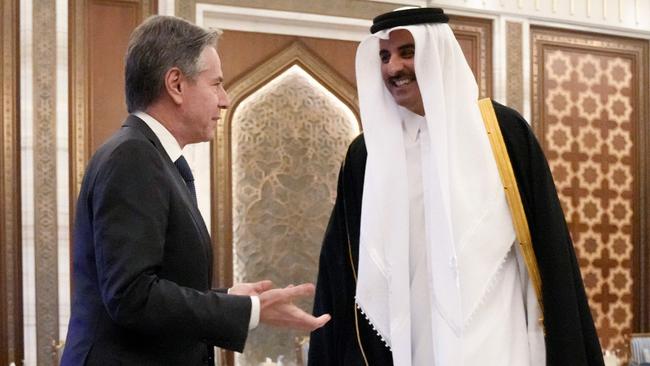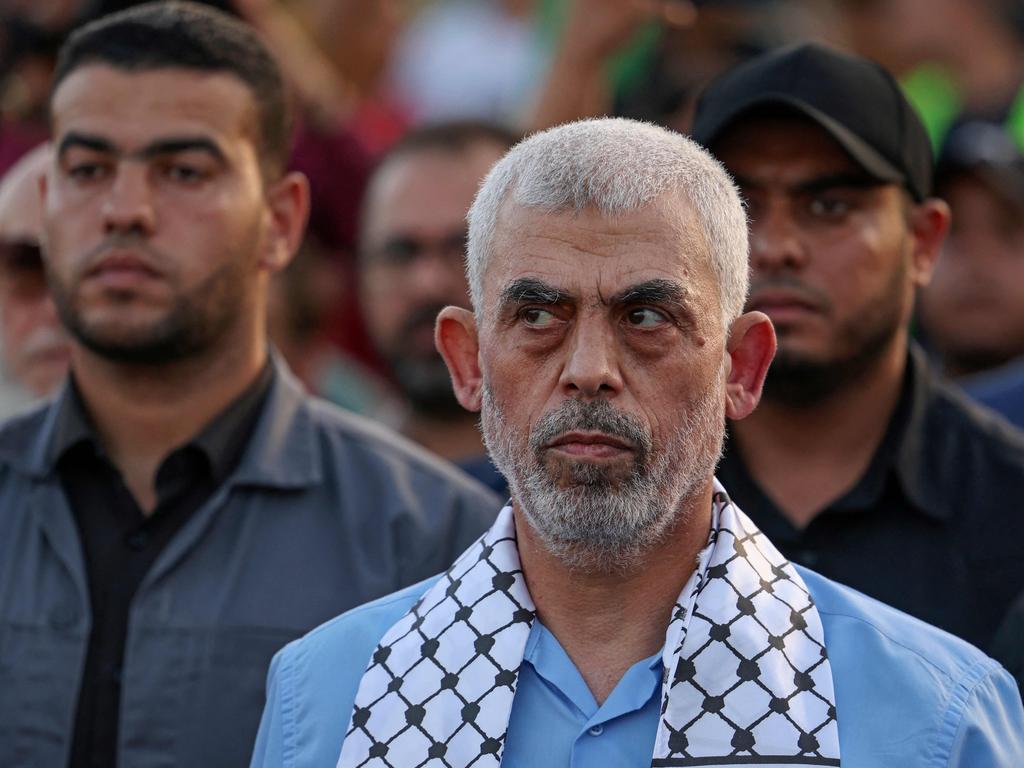Biden enlisted Qatar and Egypt to pressure Hamas. It backfired
Hamas leaders dug in after threats of arrest and expulsion from Qatar if they didn’t reach a new ceasefire with Israel. Is a pathway to a permanent cessation missing?

Qatar and Egypt have told Hamas leaders in recent days that they face possible arrest, freezing of their assets, sanctions and expulsion from their haven in Doha if they don’t agree to a ceasefire with Israel, officials familiar with the talks said.
The threats were made at the behest of the Biden administration, which is searching for a way to cajole a US-designated terrorist group into striking a deal that the President needs amid a political maelstrom over the war.
It had the opposite of the desired effect. On Thursday, after the threats were made, Hamas leader Ismail Haniyeh, the head of the group’s political bureau in exile in Qatar, said he wouldn’t agree on a deal that doesn’t meet the group’s conditions. Bearing a message from the group’s most important leader in Gaza, Yahya Sinwar, Haniyeh said the current proposal – broached by President Biden himself in a news conference a week ago – is unacceptable for Hamas because, in the group’s eyes, it doesn’t guarantee an end to the war.
Hamas’s response is the latest stumbling block for Mr Biden’s effort to revive the long-stalled negotiations toward a deal that would halt the fighting in Gaza and free Israeli hostages held by Hamas in exchange for Palestinian prisoners from Israeli jails.
In a phone call Monday, Mr Biden urged Emir Sheikh Tamim bin Hamad al-Thani of Qatar “to use all appropriate measures to secure Hamas’s acceptance of the deal’’, according to a White House statement.

US officials said they haven’t received a final answer from Hamas on the revived ceasefire proposal. “We are still waiting for an official response from Hamas,” National Security Council spokesman John Kirby said. “We’ve seen some public comments, but we don’t take those as official or in any way confirmatory one way or the other.”
The war in Gaza has killed more than 36,000 Palestinians and reduced much of the coastal enclave to rubble. Most of those killed are civilians, Palestinian health officials say, though the figures don’t specify the number of dead combatants. Israel launched its war on the Gaza Strip in response to a Hamas attack inside Israel that killed 1200 Israelis, most of them civilians, said Israeli authorities. The militant group and its allies also took about 240 hostages.
The war has heaped political pressure on Mr Biden, who faces opposition from within his own party over the US’s ongoing supply of weapons that Israel uses to bomb Gaza and criticism from Republicans over his pressuring of Israel to reduce civilian casualties.
Mr Biden attempted to break an impasse in the ceasefire negotiations last week when he delivered a speech outlining what he said was an Israeli proposal for a three-phase deal that would free the hostages that he said was part of an effort to reach a “permanent end to the war”.
Mr Biden has called Hamas “the only obstacle to a complete ceasefire.” Since Mr Biden’s speech, the talks have deadlocked over issues that have dogged negotiations for months. Hamas is demanding a guaranteed end to the war, while Israeli Prime Minister Benjamin Netanyahu says he seeks the destruction of Hamas’s military and governing capabilities, refusing to accept a permanent truce until those aims are achieved.
This week Hamas objected to language in the written version of the latest ceasefire proposal, viewed by The Wall Street Journal. The plan plays down the possibility of a permanent ceasefire, which it says would be contingent on negotiations to take place in the first phase of the deal. The proposal repeatedly mentions “sustainable calm.”
The small variation in wording has become a sticking point, particularly after Mr Netanyahu responded to Mr Biden’s speech by reiterating that Israel won’t accept a ceasefire without the destruction of Hamas’s military and governing capabilities, an aim that some Israeli and American military and intelligence officials say is likely out of reach even after eight months of fighting.
“There is a gap between what is in the paper and Biden’s statements, leading to confusion and debate,” Hamas said in a statement Wednesday.
Top US officials, including William Burns, director of the Central Intelligence Agency, flew to the Middle East this week in an effort to push forward Mr Biden’s initiative. Mr Burns held talks with the Qatari prime minister and Egypt’s intelligence chief in Doha.

Mr Burns told the Qatari and the Egyptian officials to tell Haniyeh that international mediators would guarantee that negotiations over a permanent ceasefire would begin as soon as the third week of the deal’s first phase, and that the terms of a permanent truce would be agreed upon by week five of the initial stage of the deal, according to officials familiar with the talks. Those terms are part of the written ceasefire proposal.
Haniyeh refused that suggestion, saying Hamas would only accept the deal if Israel made a written commitment to a permanent ceasefire, especially since Mr Netanyahu has publicly said he wouldn’t accept any deal that results in an enduring truce, the officials said.
It was then that Qatari and Egyptian officials told the Hamas leader that the US had asked them to deliver the warnings of possible sanctions and arrest.


This week wasn’t the first time Qatar has threatened to expel Hamas leaders from their base in Doha, where they have been based for over a decade. Qatari officials warned as early as March that Hamas leaders would face expulsion if they didn’t accept a ceasefire deal.
“They know that Qatar will have no choice but to expel them if the Americans ask them to do that,” said one official familiar with the negotiations.
Mr Biden played an instrumental role in negotiations that achieved a week-long ceasefire between Israel and Hamas in November that also freed more than 100 hostages in exchange for Palestinian prisoners. After that truce collapsed, the two sides engaged in months of fruitless indirect negotiations.
Daniel Levy, a former Israeli official and negotiator, said the current round of negotiations is at risk of repeating the failures of previous iterations.
“The Biden speech seemed to offer the tantalising prospect of breaking the impasse by setting out a path to a permanent ceasefire in which all phases would be linked,” he said.
“Once Netanyahu opposed the Phase 1 pause on-ramp to a permanent cessation, the US failed the test and caved. In refusing to assert the clear linkage to a permanent ceasefire, the Biden administration set us back on a predictable path,” he said.
– Gordon Lubold and Warren P. Strobel contributed to this article.
Dow Jones Newswires







To join the conversation, please log in. Don't have an account? Register
Join the conversation, you are commenting as Logout